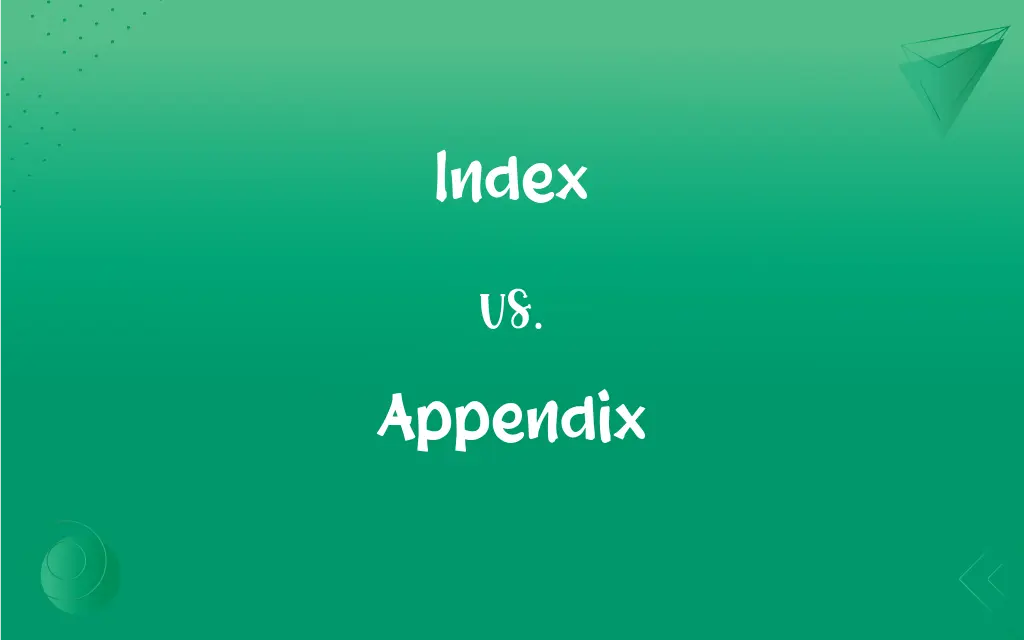Index vs. Appendix: What's the Difference?
Edited by Harlon Moss || By Janet White || Updated on October 2, 2023
An Index is an alphabetical list of topics, while an Appendix provides supplementary information; both are located at the end of a book.

Key Differences
An Index is fundamentally an alphabetical list of topics, names, and subjects, usually found at the end of a book, with corresponding page numbers where they are discussed, aimed to help readers locate specific information quickly. In contrast, an Appendix is typically utilized to provide additional, supplementary information or data that is referenced in the main body of the text but is too lengthy or detailed to be included therein.
An Index serves as a navigational tool, directing readers to the exact pages where they can find the information they are looking for, thus aiding in efficiently utilizing the content of the book. Conversely, an Appendix acts as a repository for supporting documents, charts, graphs, images, or any other additional material that can offer further insights, clarification, or explanation to the main content, enriching the reader's understanding of the subject matter.
In essence, the Index is a structured, concise map for accessing specific information within the book’s content. The Appendix, on the other hand, serves to deepen understanding and provide context, offering extended information, detailed data, or extra material related to the book’s content but not included in the main body due to its extensive or specialized nature.
The function of an Index is to facilitate ease of access to specific items, subjects, or names within a book, allowing readers to find desired information promptly. The Appendix, however, is designed to enhance comprehension and insight by providing additional resources, explanations, or related documents that complement and elaborate on the main text.
While the Index focuses on the organization and quick retrieval of information from the book's content, the Appendix emphasizes on enriching the content, by providing supplementary information, which might not be essential for the general understanding of the text but is crucial for in-depth comprehension or specialized study of the subject matter.
ADVERTISEMENT
Comparison Chart
Purpose
To help readers locate specific information quickly.
To provide supplementary or additional information.
Position
Usually found at the end of a book.
Usually found at the end of a book, following the main content.
Nature
Alphabetical and concise.
Detailed and explanatory.
Content
Contains keywords and page numbers.
May contain text, charts, tables, images, etc.
Necessity
Primarily for navigational ease.
For enhanced understanding of the main content.
ADVERTISEMENT
Index and Appendix Definitions
Index
A numerical scale used to compare variables with one another or with some reference number.
The Body Mass Index is used to assess an individual’s body weight in relation to height.
Appendix
A section at the end of a book providing additional information.
The Appendix contains the detailed mathematical proofs referenced in chapter five.
Index
A pointer or indicator in a scientific instrument.
The arrow on the Index shows the pressure level inside the chamber.
Appendix
Extra content included to provide further information on the subject.
Consult the Appendix for a more thorough explanation of the experiment’s methodology.
Index
An alphabetized list of names, places, and subjects treated in a printed work, giving the page or pages on which each item is mentioned.
Appendix
Supplementary material added to a text.
Please see the Appendix for a complete list of contributors to the project.
Index
A thumb index.
Appendix
An addition or supplement to a document.
The contract’s Appendix outlines the agreed-upon maintenance services.
Index
A table, file, or catalog.
Appendix
A tube-shaped sac attached to the large intestine.
His symptoms suggested an inflammation of the Appendix.
Index
(Computers) A list of keywords associated with a record or document, used especially as an aid in searching for information.
Appendix
An appendage.
Index
Something that reveals or indicates; a sign
"Her face ... was a fair index to her disposition" (Samuel Butler).
Appendix
A collection of supplementary material, usually at the end of a book.
Index
A character (☞) used in printing to call attention to a particular paragraph or section. Also called hand.
Appendix
(Anatomy) Any of several supplementary or accessory parts of a bodily organ or structure, especially the vermiform appendix of the large intestine.
Index
An indicator or pointer, as on a scientific instrument.
Appendix
Something attached to something else; an attachment or accompaniment.
Index
(Mathematics) A number or symbol, often written as a subscript or superscript to a mathematical expression, that indicates an operation to be performed, an ordering relation, or a use of the associated expression.
Appendix
A text added to the end of a book or an article, containing additional information.
Index
A number derived from a formula, used to characterize a set of data.
Appendix
(anatomy) The vermiform appendix.
Index
A statistical value that represents the price or value of an aggregate of goods, services, wages, or other measurable quantities in comparison with a reference number for a previous period of time.
Appendix
(anatomy) Any process, prolongation, or projection.
Index
A number that represents the change in price or value of stocks or other securities in a particular market, sector, or asset class.
Appendix
Something appended or added; an appendage, adjunct, or concomitant.
Normandy became an appendix to England.
Index
The stocks or other securities represented by an index.
Appendix
Any literary matter added to a book, but not necessarily essential to its completeness, and thus distinguished from supplement, which is intended to supply deficiencies and correct inaccuracies.
Index
Index Roman Catholic Church A list formerly published by Church authority, restricting or forbidding the reading of certain books.
Appendix
The vermiform appendix.
Index
To furnish with an index
Index a book.
Appendix
Supplementary material that is collected and appended at the back of a book
Index
To enter in an index.
Appendix
A vestigial process that extends from the lower end of the cecum and that resembles a small pouch
Index
To indicate or signal.
Index
To adjust through indexation.
Index
An alphabetical listing of items and their location.
The index of a book lists words or expressions and the pages of the book upon which they are to be found.
Index
The index finger; the forefinger.
Index
A movable finger on a gauge, scale, etc.
Index
(typography) A symbol resembling a pointing hand, used to direct particular attention to a note or paragraph.
Index
That which points out; that which shows, indicates, manifests, or discloses.
Index
A sign; an indication; a token.
Index
(linguistics) A type of noun where the meaning of the form changes with respect to the context; e.g., 'Today's newspaper' is an indexical form since its referent will differ depending on the context. See also icon and symbol.
Index
(economics) A single number calculated from an array of prices or of quantities.
Index
(science) A number representing a property or ratio; a coefficient.
Index
(mathematics) A raised suffix indicating a power.
Index
An integer or other key indicating the location of data, e.g. within an array, vector, database table, associative array, or hash table.
Index
A data structure that improves the performance of operations on a table.
Index
(obsolete) A prologue indicating what follows.
Index
(transitive) To arrange an index for something, especially a long text.
MySQL does not index short words and common words.
Index
To inventory; to take stock.
Index
To normalise in order to account for inflation; to correct for inflation by linking to a price index in order to maintain real levels.
Index
To measure by an associated value.
Index
To be indexical for (some situation or state of affairs); to indicate.
Index
(computing) To access a value in a data container by an index.
Index
That which points out; that which shows, indicates, manifests, or discloses; as, the increasing unemployment rate is an index of how much the economy has slowed.
Tastes are the indexes of the different qualities of plants.
Index
That which guides, points out, informs, or directs; a pointer or a hand that directs to anything, as the hand of a watch, a movable finger or other form of pointer on a gauge, scale, or other graduated instrument.
Index
A table for facilitating reference to topics, names, and the like, in a book, usually giving the page on which a particular word or topic may be found; - usually alphabetical in arrangement, and printed at the end of the volume. Typically found only in non-fiction books.
Index
A prologue indicating what follows.
Index
The second finger, that next to the pollex (thumb), in the manus, or hand; the forefinger; index finger.
Index
The figure or letter which shows the power or root of a quantity; the exponent.
Index
The ratio, or formula expressing the ratio, of one dimension of a thing to another dimension; as, the vertical index of the cranium.
Index
A number providing a measure of some quantity derived by a formula, usually a form of averaging, from multiple quantities; - used mostly in economics; as, the index of leading indicators; the index of industrial production; the consumer price index. See, for example, the consumer price index.
Index
A file containing a table with the addresses of data items, arranged for rapid and convenient search for the addresses.
Index
A number which serves as a label for a data item and also represents the address of a data item within a table or array.
Index
The Index prohibitorius, a catalogue of books which are forbidden by the church to be read; also called Index of forbidden books and Index Librorum Prohibitorum.
Index
To provide with an index or table of references; to put into an index; as, to index a book, or its contents.
Index
To adjust (wages, prices, taxes, etc.) automatically so as to compensate for changes in prices, usually as measured by the consumer price index or other economic measure. Its purpose is usually to copensate for inflation.
Index
To insert (a word, name, file folder, etc.) into an index or into an indexed arrangement; as, to index a contract under its date of signing.
Index
A numerical scale used to compare variables with one another or with some reference number
Index
A number or ratio (a value on a scale of measurement) derived from a series of observed facts; can reveal relative changes as a function of time
Index
A mathematical notation indicating the number of times a quantity is multiplied by itself
Index
An alphabetical listing of names and topics along with page numbers where they are discussed
Index
The finger next to the thumb
Index
List in an index
Index
Provide with an index;
Index the book
Index
Adjust through indexation;
The government indexes wages and prices
Index
An alphabetized list at the end of a book.
Refer to the Index to find the page number for “photosynthesis.”
Index
A sign or measure of something.
The Consumer Price Index reflects changes in the cost of living.
Index
In programming, it represents the position of data within an array.
The function will return the Index of the element found in the array.
FAQs
Can both Index and Appendix be found in any book?
Not all books, but they are common in academic texts and manuals.
Is an Index detailed?
No, an Index is concise, listing topics with page numbers.
Can an Appendix include charts or graphs?
Yes, it often contains such supplementary materials.
What is an Appendix?
It is a section at the end of a book providing supplementary information.
Can a book have more than one Appendix?
Yes, books can have multiple appendices for different supplementary information.
Does an Index provide explanations?
No, it only lists topics and page numbers.
What is an Index?
It is an alphabetical list of topics at the end of a book.
Is an Index mandatory in books?
No, it’s optional but useful for locating information quickly.
Is information in the Index counted as part of the main content?
No, it is separate and located at the end of the book.
How is an Index arranged?
It’s usually arranged alphabetically.
Can an Appendix contain text only?
No, it can also contain images, tables, charts, etc.
Can the Appendix include references?
Yes, it can include references and additional resources.
Is the information in an Appendix crucial for understanding the main content?
It’s supplementary; the main content should be understandable without it.
Do all academic books have both an Index and an Appendix?
No, but they are common features in academic books.
Is information in the Appendix considered less important?
Not necessarily, it’s supplementary but can be crucial for in-depth understanding.
What is the purpose of an Appendix?
To provide additional information or clarification on the main text.
What type of books usually have an Index?
Academic books, manuals, and reference books commonly have an Index.
Is creating an Index a meticulous process?
Yes, it involves careful organization and structuring of the book’s content.
Can the Appendix be used for detailed explanations of a point made in the main text?
Yes, it’s often used for detailed, supplementary explanations.
Can information in the Appendix be summarized?
Yes, it often contains summarized additional information.
About Author
Written by
Janet WhiteJanet White has been an esteemed writer and blogger for Difference Wiki. Holding a Master's degree in Science and Medical Journalism from the prestigious Boston University, she has consistently demonstrated her expertise and passion for her field. When she's not immersed in her work, Janet relishes her time exercising, delving into a good book, and cherishing moments with friends and family.
Edited by
Harlon MossHarlon is a seasoned quality moderator and accomplished content writer for Difference Wiki. An alumnus of the prestigious University of California, he earned his degree in Computer Science. Leveraging his academic background, Harlon brings a meticulous and informed perspective to his work, ensuring content accuracy and excellence.
































































